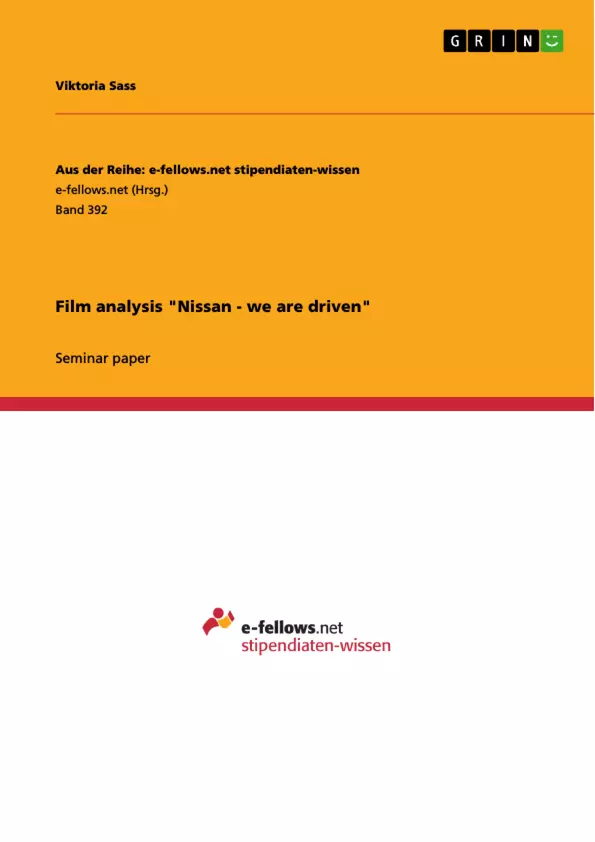The film “Nissan – we are driven” of 1984 by Stephanie Tepper which is examined in the following case study, is a documentation about working conditions, trade unionism and management styles at Nissan, one of the biggest Japanese automobile manufacturers. The film shows the situation of workers in several plants in Japan as well as the application of the Japanese management system to a Nissan plant in Tennessee, USA.
At first, some general cultural differences between the USA and Japan and their consequences for the employment relations are explored. Then, the different employment practices in the two plants are explained.
Inhaltsverzeichnis (Table of Contents)
- Introduction
- Cultural Differences between the US and Japan
- Employment Practices at Nissan
- The Japanese Nissan Plants
- The Nissan Plant in Tennessee, USA
- Conclusion
Zielsetzung und Themenschwerpunkte (Objectives and Key Themes)
This film analysis explores the working conditions, trade unionism, and management styles at Nissan, a major Japanese automobile manufacturer. The film contrasts the employment practices in Nissan plants in Japan and Tennessee, USA, highlighting cultural differences and their impact on labor relations.
- Cultural differences between the US and Japan
- Impact of cultural differences on employment practices
- Analysis of unitarist labor relations in Japanese Nissan plants
- Comparison of labor relations in Japanese and American Nissan plants
- Evaluation of Nissan's management style and its effects on worker satisfaction
Zusammenfassung der Kapitel (Chapter Summaries)
- Introduction: This chapter introduces the film "Nissan - We Are Driven," which documents working conditions, trade unionism, and management styles at Nissan. It outlines the film's focus on comparing the situation of workers in Japanese and American Nissan plants.
- Cultural Differences between the US and Japan: This chapter explores the cultural differences between the US and Japan using Hofstede's five cultural dimensions. These dimensions, including power distance, uncertainty avoidance, individualism/collectivism, masculinity/femininity, and long-term/short-term orientation, provide a framework for understanding different management practices in both countries.
- Employment Practices at Nissan: This chapter examines the different employment practices in Japanese and American Nissan plants. The chapter highlights the contrasting styles of labor relations and management strategies used in each location.
- The Japanese Nissan Plants: This chapter analyzes the labor relations system in Japanese Nissan plants. The chapter describes the unitarist model of labor relations, characterized by a close partnership between management and employees, and explores the role of company unions and their impact on worker satisfaction.
- The Nissan Plant in Tennessee, USA: This chapter investigates the implementation of a hybrid management style at the Nissan plant in Tennessee. The chapter examines how Nissan adopted aspects of Japanese management practices while also adapting to the American workplace culture.
Schlüsselwörter (Keywords)
The central keywords of this text include: cultural differences, employment practices, unitarist labor relations, company unions, management styles, worker satisfaction, Nissan, Japan, USA, Hofstede's cultural dimensions. The text explores the impact of cultural differences on workplace dynamics, particularly in the context of international corporations like Nissan. The analysis focuses on comparing and contrasting the labor relations and management strategies employed in Japanese and American Nissan plants.
Frequently Asked Questions
What is the documentary "Nissan – we are driven" about?
It is a 1984 film exploring working conditions, trade unionism, and management styles at Nissan plants in both Japan and the USA.
How are cultural differences between the US and Japan analyzed?
The analysis uses Hofstede's five cultural dimensions, such as power distance and individualism vs. collectivism, to explain management variations.
What is the "unitarist" model of labor relations?
Common in Japanese Nissan plants, it features a close partnership between management and employees, often involving company-specific unions.
Did Nissan use Japanese management styles in its US plant?
Yes, the plant in Tennessee implemented a hybrid style, adapting Japanese practices to the American workplace culture.
What was the impact on worker satisfaction?
The study evaluates how different management strategies and the role of unions influenced how satisfied workers were in both countries.
- Quote paper
- Viktoria Sass (Author), 2011, Film analysis "Nissan - we are driven", Munich, GRIN Verlag, https://www.grin.com/document/190995



